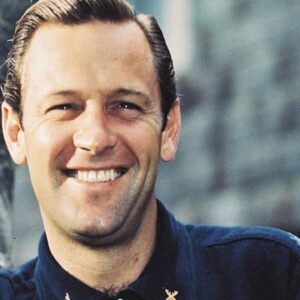William Franklin Beedle, Jr., better known by his stage name William Holden, was an American actor best known for his iconic performance in the 1953 film “Stalag 17,” which helped him win the Academy Award for “Best Actor.” In 1973, he was also honored with a “Primetime Emmy Award” for his performance as “The Blue Knight’s” most “Outstanding Lead Actor.” He rose to fame as an actor between 1950 and 1970, appearing in many big-budget movies like “The Bridge on the River Kwai,” “Sunset Boulevard,” “The Wild Bunch,” “The Towering Inferno,” “Sabrina,” and “Network.” Six times he was named one of the “Top 10 Stars of the Year,” and the “American Film Institute” listed him as one of the “25 Greatest Male Stars” of Hollywood. From his very first movie, he was known as “Golden Boy,” and he was also referred to as “Golden Holden” occasionally. He spent a lot of time traveling to Africa, where he co-operated with Switzerland to run the “Mount Kenya Safari Club.” He was ranked number 63 among the “100 hottest stars” in movie history. At Ronald and Nancy Reagan’s wedding, he served as best man.
Early Childhood & Life
William Holden was born on April 17, 1918, to industrial chemist William Franklin Beedle, Sr. in O’Fallon, Illinois, in the United States. Mary Blanche Ball, his mother, was a teacher.
Robert and Richard were the names of his two younger brothers.
When he was three years old, his affluent family relocated from O’Fallon to South Pasadena.
He attended South Pasadena High School for his education.
He attended “Pasadena Junior College” to study chemistry after graduating from high school, where he also participated in playing in several plays.
William Holden’s Career
When William Holden was still an unknown actor, his acting career began with the 1939 movie “Golden Boy.”
Invisible Stripes and Our Town, both produced by Warner Bros., were his next motion pictures.
During the Second World War, he enlisted as a Second Lieutenant in the US Army Air Forces.
With the release of the movie “Sunset Boulevard” in 1950, his fame as an actor grew, and he was nominated for his first Oscar for “Best Actor” that year.
He appeared in the comedy “Born Yesterday” in 1950.
He played the main character in “Stalag 17” in 1953, for which he won the Academy Award for Best Actor.
In 1953, he appeared in a few comedies including “The Moon is Blue” and “Forever Female.”
In 1954, he appeared in the movies “Executive Suit,” “Country Girl,” and “The Bridges at Toko-Ri.”
He appeared in “Sabrina” in 1954, and while the movie was being made, he began dating Audrey Hepburn.
He appeared in the films “Picnic” and “Love Is a Many-Splendored Thing” in 1955.
In 1955, he made a guest appearance on “I Love Lucy.”
In 1957, he made his subsequent appearance in the well-known film “The Bridge on the River Kwai.”
In 1958’s The Key and 1959’s The Horse Soldiers, he played the lead role.
Due to certain tax complications, he had to go to Switzerland in 1959, and he didn’t come back to the US until 1967.
He developed an alcohol problem between 1960 and 1970, and his movies started to lose their attractiveness.
He costarred with Audrey Hepburn in the 1964 movie “Paris When It Sizzles.”
With the release of “The Wild Bunch,” he made a comeback. He also starred in “L’Arbre de Noel,” which was translated into English as “The Christmas Tree” and released as a home video titled “When Wolves Cry” in the US.
He starred in the financially unsuccessful 1973 movie “Breezy.”
He played a fierce street cop in the 1974 television movie “Blue Knight.”
In 1974, he appeared in the critically acclaimed movie “The Towering Inferno,” which made Holden a fortune at the box office.
He acted in the 1976 movie “Network,” which drew a ton of praise from critics and earned him another Oscar nomination.
In 1980, he starred in the movie “The Earthling,” which was set in the Australian outback.
At the tail end of his acting career, he appeared in “When Time Ran Out,” which was not as well received as his final part in “S. O. B.,” for which he received a Golden Globe nomination.
He was approached about a part in “That Championship Season” in 1981, but since filming couldn’t begin until 1982, he fell into a depression and upped his drinking.
Recognition & Achievements
In 1953, William Holden received the “Academy Award for Best Actor” for his performance in “Stalag 17”.
He received two stars in recognition: one on the “St. Louis Walk of Fame” and one on the “Hollywood Walk of Fame.”
The Canadian band “Blue Rodeo” memorialized him in the song “Floating.”
Personal Legacy & Life
On July 12, 1941, he wed Brenda Marshall; they were divorced in 1971. From this union, he had two sons: Peter and Scott. Virginia, a child from a previous marriage to Brenda Marshall, was also adopted by him.
With the actress Eva May Hoffman, he has a daughter named Arlene who was raised by her mother.
William Holden passed away after a severe brain injury sustained in a fall at his house on November 12, 1981, in Santa Monica, California, in the United States.
Estimated Net Worth
An American actor named William Holden had a $20 million fortune. William Holden died in November 1981. He was born in O’Fallon, Illinois, in April 1918. In the 1950s, he was one of the tops draws at the box office. Stalag 17, The Blue Knight, Sunset Boulevard, The Bridge on the River Kwai, Sabrina, Picnic, The Wild Bunch, Network, and The Towering Inferno are just a few of the films in which Holden starred.
Trivia
Animal advocate and animal lover William Holden supported animal rights. He purchased a sizable parcel of land in Africa to serve as an animal sanctuary. He spoke against animal trafficking and poaching.


